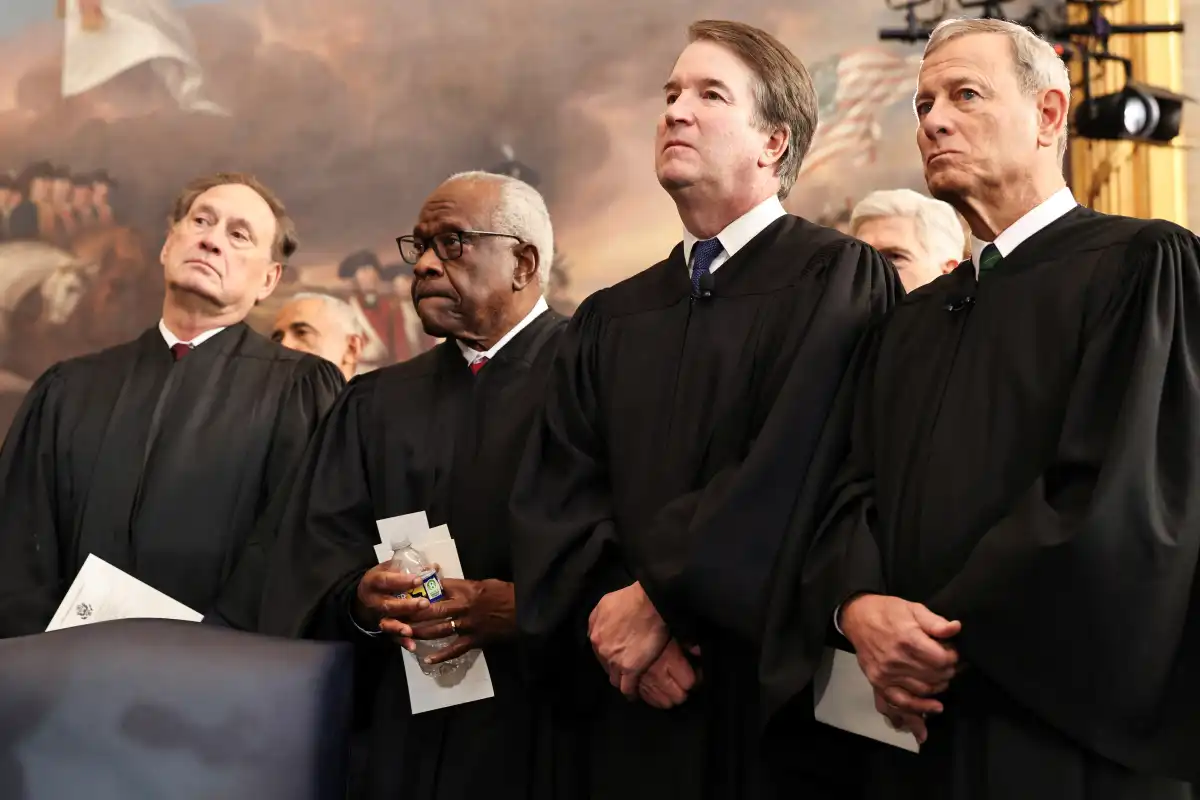In a landmark order with sweeping implications for transgender Americans, the U.S. Supreme Court on Thursday allowed President Donald Trump’s administration to enforce a new passport policy requiring all applicants to list the sex assigned at birth, rather than their gender identity, on official documents.
The decision — issued on an emergency basis and without full briefing or oral argument — temporarily lifts a lower court’s injunction that had blocked the rule, clearing the way for the administration to move forward with one of its most controversial policies since Trump’s return to the presidency in January 2025.
The unsigned order was met with immediate outrage from LGBTQ+ advocates, civil rights groups, and the court’s three liberal justices, who sharply dissented, warning that the ruling inflicts tangible harm on transgender Americans and undermines decades of precedent on equal protection.
Policy Restores Birth-Sex Requirement for Passports
Under the Trump administration’s policy, passports must now display only a person’s sex assigned at birth, removing the ability for transgender individuals to request gender-congruent documentation. The administration argued that the change restores “biological accuracy” and “clarity in international identification,” but critics say it’s part of a wider government campaign to erase recognition of transgender identities in federal law.
The court’s decision grants the Justice Department’s emergency request to lift the injunction issued by U.S. District Judge Julia Kobick, who in April ruled that the policy likely violates the Fifth Amendment’s equal protection guarantee and reflects “irrational prejudice” toward transgender people.
In its brief explanation, the Supreme Court majority rejected that reasoning, writing that the government was merely “attesting to a historical fact.”
“Displaying passport holders’ sex at birth no more offends equal protection principles than displaying their country of birth,” the court said in its unsigned order. “In both cases, the government is merely documenting an objective fact without subjecting anyone to differential treatment.”
The order means the State Department can immediately begin rejecting passport applications that list a gender different from that assigned at birth — even as the broader class-action lawsuit against the policy continues to move through the courts.
Liberal Justices Sound Alarm
Justices Ketanji Brown Jackson, Sonia Sotomayor, and Elena Kagan issued a rare public dissent, condemning the decision as a dangerous rollback of civil rights.
Justice Jackson, writing for the dissent, warned that the majority’s action “permits harm to be inflicted on the most vulnerable party,” emphasizing that transgender Americans are being singled out for unequal treatment under the guise of bureaucratic procedure.
“In preventing transgender Americans from obtaining gender-congruent passports, the government is doing more than just making a statement about its belief that transgender identity is ‘false,’” Jackson wrote. “The passport policy invites the probing, and at times humiliating, additional scrutiny these plaintiffs have already experienced.”
She added that the ruling not only denies recognition to transgender individuals but also legitimizes discrimination by treating their gender identity as a form of falsehood.
The dissent echoed growing alarm among LGBTQ+ advocates, who have warned that the Trump administration’s actions since January represent the most aggressive federal campaign against transgender rights in modern U.S. history.
A Sharp Reversal of Biden-Era Policy
The decision represents a dramatic reversal from the Biden administration’s 2021 reforms, which allowed Americans to self-select the gender marker on their passports — male, female, or “X” for nonbinary, intersex, and gender-nonconforming individuals — without medical documentation.
That policy had been hailed as a major milestone for transgender rights, marking the first time U.S. federal identification documents recognized nonbinary identities.
But since taking office in January, Trump has systematically dismantled those changes. In a January 2025 executive order, he directed all federal agencies to recognize only two sexes — male and female — based strictly on “immutable biological characteristics.” The State Department, Department of Education, and Department of Health and Human Services were among the first to implement compliance measures.
Critics say the passport policy is part of a broader ideological campaign that conflates “gender identity” with what the administration calls “gender ideology.”
“Trump’s White House is reengineering federal bureaucracy to erase transgender existence from every level of government,” said Erin Reed, a transgender policy journalist and advocate. “This isn’t about passports — it’s about erasing recognition entirely.”
Judge Had Called Policy ‘Irrational’ and ‘Prejudiced’
Earlier this year, Judge Julia Kobick, a Boston-based U.S. District Judge, found that the administration’s policy discriminated on the basis of sex and lacked any legitimate justification.
In her April ruling, Kobick described the policy as “rooted in irrational prejudice rather than administrative necessity,” noting that it violated both the Fifth Amendment’s equal protection clause and the Administrative Procedure Act, which prohibits arbitrary or capricious government actions.
She issued a nationwide injunction in June, temporarily halting enforcement of the rule while the case proceeded. However, the Trump administration immediately appealed to the 1st U.S. Circuit Court of Appeals, which refused to lift Kobick’s injunction in September — prompting the Justice Department to take the case directly to the Supreme Court.
In their filing, government lawyers argued that lower courts had overstepped their authority by “forcing the federal government to issue identification documents containing inaccurate information.”
“Private citizens cannot compel the government to use inaccurate sex designations on identification documents,” Justice Department attorneys wrote. “Identification documents are government property and serve as an exercise of the president’s constitutional power to communicate with foreign governments.”
Legal and Human Impact
For transgender Americans, the implications are profound. Plaintiffs in the class-action lawsuit said that being forced to carry passports that do not match their gender identity places them at constant risk of harassment, interrogation, or even detainment when traveling abroad.
“We seek the same thing millions of Americans take for granted: passports that allow us to travel without fear of misidentification, harassment, or violence,” they said in court filings.
LGBTQ+ organizations have described the policy as both discriminatory and dangerous. Lambda Legal, one of the groups representing the plaintiffs, said in a statement Thursday that the Supreme Court’s decision “will expose countless transgender people to mistreatment and humiliation.”
“Transgender people already face widespread hostility at airports, borders, and security checkpoints,” the group said. “This policy will make them even more vulnerable.”
Pattern of Policies Targeting Transgender Americans
Thursday’s decision marks the third major Supreme Court intervention this year in favor of Trump administration policies restricting transgender rights.
In May 2025, the justices allowed the Pentagon to enforce Trump’s ban on transgender individuals serving in the U.S. military, a move that Defense Secretary Pete Hegseth defended in inflammatory terms, referring to transgender service members as “dudes in dresses.”
Then, in August, the court cleared the way for the administration to cut federal National Institutes of Health funding for projects involving LGBTQ+ research, part of a wider rollback of diversity and inclusion initiatives.
Together, these rulings underscore how the court’s 6–3 conservative majority has become a reliable ally for the Trump administration’s cultural and social agenda.
Legal scholars note that the pattern mirrors the court’s increasing use of its “shadow docket” — emergency decisions made without full argument — to reshape national policy without the usual judicial process.
“This is policymaking through midnight orders,” said Stephen Vladeck, a law professor at the University of Texas. “Each time the court steps in, it sends a signal that lower courts have little power to check the executive branch — especially on politically charged issues.”
A Deepening Divide
The passport case highlights the growing ideological divide in the United States over gender identity and the role of government recognition. Supporters of the policy say it restores “clarity and integrity” to official documentation, while opponents see it as a deliberate attempt to erase transgender existence from civic life.
For those directly affected, the ruling is more than symbolic. “It’s about dignity,” said one of the plaintiffs, speaking anonymously due to safety concerns. “Every time I show my passport, I’m forced to defend who I am.”
With the case still ongoing in the lower courts, Thursday’s order does not end the legal battle — but it allows the administration’s rule to take immediate effect. For now, transgender Americans seeking passports that reflect their gender identity will once again face a painful choice: comply with a designation they reject, or forgo a passport altogether.

Emily Johnson is a critically acclaimed essayist and novelist known for her thought-provoking works centered on feminism, women’s rights, and modern relationships. Born and raised in Portland, Oregon, Emily grew up with a deep love of books, often spending her afternoons at her local library. She went on to study literature and gender studies at UCLA, where she became deeply involved in activism and began publishing essays in campus journals. Her debut essay collection, Voices Unbound, struck a chord with readers nationwide for its fearless exploration of gender dynamics, identity, and the challenges faced by women in contemporary society. Emily later transitioned into fiction, writing novels that balance compelling storytelling with social commentary. Her protagonists are often strong, multidimensional women navigating love, ambition, and the struggles of everyday life, making her a favorite among readers who crave authentic, relatable narratives. Critics praise her ability to merge personal intimacy with universal themes. Off the page, Emily is an advocate for women in publishing, leading workshops that encourage young female writers to embrace their voices. She lives in Seattle with her partner and two rescue cats, where she continues to write, teach, and inspire a new generation of storytellers.









